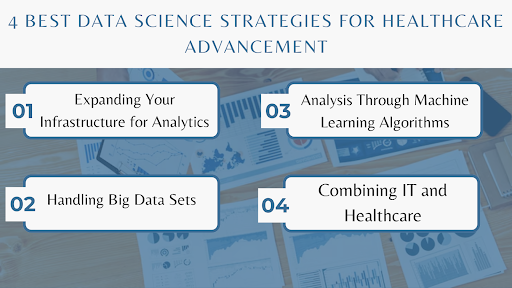To sign up for our daily email newsletter, CLICK HERE
Imagine a world in which your doctor has incredible predictive power to determine what health problems you may have down the road or where therapies are customized based entirely on your genetic composition. This isn’t science fiction—it’s the transformative power of data science in healthcare. As we all know, the healthcare sector generates essential patient data, including treatment plans, patient demographics, test results, and more. To manage this vast amount of information, data science is the ideal tool. Data science offers medical insights and supports decision-making throughout all healthcare phases.
Making decisions based on data creates new opportunities to enhance healthcare. From predicting disease outbreaks to optimizing treatment plans, data science is not just improving healthcare—it’s revolutionizing it. Dive into this advanced technology and its discoveries, use cases, and future in healthcare.
Why Data Science In Healthcare
There is no doubt that data science is revolutionizing the healthcare sector by enhancing patient outcomes via insights derived from data, leading to better therapies and more efficient resource use. It drives innovation in medical research and healthcare by enabling precision medicine tailored to the treatment of individual patients.-
Data Science also enhances collaboration across the healthcare ecosystem by fostering a more efficient and effective care delivery system. Early warning systems and predictive analytics help healthcare systems prepare for public health emergencies. Furthermore, by streamlining care and expanding access to medical services, data science enhances the patient experience.
4 Best Data Science Strategies for Healthcare Advancement
Utilizing the massive volumes of data produced by the healthcare sector will require a systematic approach towards data science advancements. Key to this progress is the commitment to hire data scientists who can drive the implementation of cutting-edge analytics and predictive models. By integrating their knowledge, healthcare providers can gain essential insights, enhance operational efficiency, and improve patient outcomes.

1. Expanding Your Infrastructure for Analytics
Invest in modern data storage systems and scalable cloud solutions to manage the expanding healthcare data. Robust data integration platforms ensure smooth access and analysis across many sources. This infrastructure change improves real-time data processing and produces faster and more accurate healthcare insights.
2. Handling Big Data Sets
As was previously mentioned, data science in healthcare is an ideal instrument for managing large amounts of data. By revealing complex patient insights, data science efficiently manages massive amounts of data to improve the accuracy of diagnosis and treatments.
Complex health patterns may be quickly analyzed using real-time processing technology and advanced data storage systems that simplify data handling. This tactical strategy enhances patient outcomes and encourages preventative healthcare measures.
3. Analysis Through Machine Learning Algorithms
Machine learning algorithms can sort through enormous volumes of patient data to find patterns and forecast health consequences with unprecedented accuracy. These algorithms make proactive therapies and individualized care plans possible by spotting small trends and potential hazards.
This helps recognize disease-related trends and predict future healthcare outcomes, empowering medical professionals to choose the best action.
4. Combining IT and Healthcare
Integrating healthcare with information technology is crucial for advancing patient care. Healthcare systems can examine massive volumes of patient data to anticipate health risks and customize treatment strategies using AI and machine learning algorithms. By supporting preventative healthcare and improving diagnosis accuracy, this strategy reduces the need for emergency interventions.
The Future of Data Science In Healthcare
As data science advances, it will open up new avenues for patient treatment by fusing artificial intelligence with real-time patient insights for unprecedented efficiency and precision, among other benefits. Some of the future revolutions are given below.
1. Adopting Predictive Analytics and Real-Time Monitoring
Data science advancements will facilitate real-time health monitoring via advanced devices and remote sensors, providing continuous data streams for immediate analysis. Predictive analytics will identify potential health issues using this data, enabling proactive measures that will significantly enhance patient care.
2. Machine Learning and Artificial Intelligence
Data science in healthcare is undoubtedly shaping the medical sector. And Integrating this data science with AI and ML will revolutionize this industry by enabling unprecedented data analysis and prediction levels. AI-driven algorithms will optimize treatment plans and automate difficult diagnostic chores. Conversely, machine learning will help optimize administrative processes, reduce costs, and enhance patient outcomes.
3. Data Science with AR and VR
In conjunction with AR and VR, data science will transform healthcare by providing individualized, immersive therapies and cutting-edge surgical training that elevate medical skills. These technologies will be pivotal in real-time data analysis, improving surgical accuracy, and transforming patient care.
4. Privacy and Ethics
Balancing innovative data-driven insights with stringent privacy regulations will redefine patient trust. This means that future developments in healthcare will be built on the ethical use of data. As data science evolves, it is necessary to safeguard patients’ rights while leveraging the full potential of data, which will be pivotal in shaping a secure, patient-centric healthcare landscape.
Conclusion
Data science is transforming healthcare, bringing unprecedented precision and efficiency to patient care and treatment. As technology develops, the application of data science in healthcare will transform patient treatment, moving from individualized therapies to proactive health management.
The future of healthcare lies in harnessing these insights while maintaining ethical standards and privacy. Healthcare providers may fully utilize the potential of data to develop a more efficient and patient-centered healthcare system by utilizing professional data science consulting services. As we look ahead, the fusion of technology and data science promises to elevate healthcare to new heights, making the impossible possible.